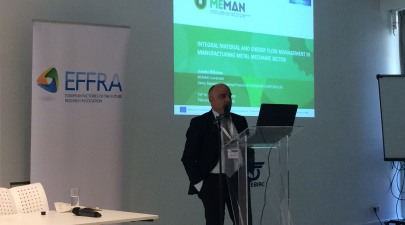
The European Factories of the Future Research Association (EFFRA), the European Road Transport Research Advisory Council (ERTRAC) and the European Green Vehicles Initiative Association (EGVIA) co-hosted the “Factories of the Future for the Automotive Sector” workshop on 28 February 2018 in Brussels. The workshop focused on the results of projects that address manufacturing in the automotive sector and provided good opportunities for networking between project presenters and participants.
Mondragon Senior Manager Joseba Bilbatua presented the EU funded MEMAN project, as a concrete solution the automotive section could adopt to improve its sustainability.
A toolbox to assess the optimal use of resources
Studies show that the consumption of energy and raw materials in manufacturing over the next 20 years will increase by 40%. The strategies to improve the economic and environmental performance of companies are usually pursued from a local perspective, rarely considering interactions across the entire value chain.
To solve these shortcomings, the MEMAN project has developed an integrated methodology that, for the first time, covers both company and value chain levels to reveal hidden resource saving potentials on a global scale. The methodology comprises the development of a decision-making toolbox that helps companies to assess and decide about strategies to improve their resource efficiency.
The case of the casting cluster
MEMAN looks at three case-studies: the casting, machining and surface finishing clusters. The casting cluster is the most relevant for the automotive industry. In this cluster, partners analysed the resource saving potential in the production process of an aluminium component for the suspension system of cars.
The MEMAN methodology assessed which changes should be introduced in the manufacturing process, or in the design of the product to optimise the use of raw materials and cut CO2 emissions.
The new design brought as a result:
- A 20% reduction in the use of raw materials, resulting in almost 24% less CO2 emissions during the manufacturing phase from cradle to gate;
- An additional cut of over 11% in CO2 emissions during the use phase, due to lighter vehicles consuming less fuel;
- This leads to a total reduction of 35% in CO2 emissions;
- Finally, the life cycle cost of the aluminium component is reduced by a 15%.
The results of the casting cluster are therefore very satisfying and show how much potential the automotive industry has to improve its sustainability right from the cradle of its product.
Have a look at the PowerPoint presentation on MEMAN
For more information, please contact:
Joseba Bilbatua (jbilbatua@mondragoncorporation.com)
Valeria Mazzagatti (valeria.mazzagatti@greenovate.eu)